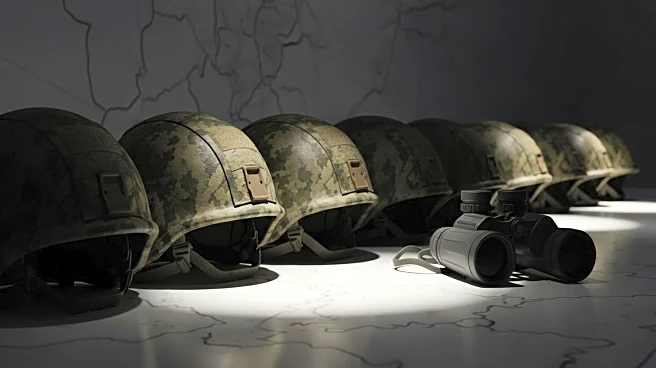What is the story about?
What's Happening?
The United States has announced the deployment of 200 troops as part of a joint task force aimed at stabilizing Gaza. According to two senior U.S. officials, these troops will not enter the Palestinian enclave but will form the core of a task force that includes representatives from Egypt's military, Qatar, Turkey, and potentially the United Arab Emirates. The exact location of the U.S. troops has yet to be determined, but they will establish a joint control center and integrate other security forces to coordinate with Israeli forces, aiming to prevent clashes. This initiative is part of broader efforts to cool regional tensions and facilitate negotiations for further normalization deals between Israel and Arab nations.
Why It's Important?
The deployment of U.S. troops as part of a multinational task force underscores the United States' commitment to stabilizing the region without direct military involvement in Gaza. This approach reflects a strategic shift towards diplomatic and collaborative efforts in Middle Eastern peace processes. The task force's success could pave the way for more normalization agreements between Israel and Arab countries, following the precedent set by the Abraham Accords brokered by President Trump. These accords have already led to improved relations between Israel and several Arab nations, potentially reshaping geopolitical dynamics in the region.
What's Next?
The establishment of the joint control center and integration of security forces will be crucial next steps in the task force's operation. The success of this initiative could influence future diplomatic engagements and peace negotiations in the Middle East. Stakeholders, including political leaders and international organizations, will likely monitor the task force's progress closely. The outcome may impact U.S. foreign policy and its role in Middle Eastern affairs, as well as the broader geopolitical landscape involving Israel and its neighboring countries.
Beyond the Headlines
The task force's formation highlights the evolving nature of international military cooperation, emphasizing multilateral efforts over unilateral actions. This development may set a precedent for future peacekeeping missions, where regional powers collaborate with global actors to address complex conflicts. Additionally, the initiative could influence public perception of U.S. involvement in foreign conflicts, potentially affecting domestic political discourse on military engagement and international diplomacy.


















